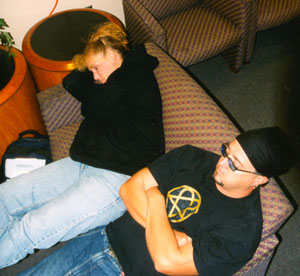Students encouraged to get enough sleep
Students are constantly waking up with that same old feeling of not wanting to get out of bed and dreading another day of fighting to stay awake through classes. This is a continuous problem that affects people daily. A study done by the Sleep Foundation of America showed that insomnia most commonly occurs in college students.

This archived article was written by: Gypsie Delgado
Students are constantly waking up with that same old feeling of not wanting to get out of bed and dreading another day of fighting to stay awake through classes. This is a continuous problem that affects people daily. A study done by the Sleep Foundation of America showed that insomnia most commonly occurs in college students.
People, ages 18 to 29, are more likely to be sleepy during the day, more likely to take medications to stay awake and have more trouble sleeping on weekday nights. Lifestyles take part in insomnia including things like stress, caffeine use, alcohol use and irregular sleeping cycles.
According to Sleepfoundation.org, 55 percent of adults 18-29 years old admit to staying up to watch TV or spend time on the Internet. “Generation Y” say they will sleep less just to get more done. They also reported that 22 percent of adults are occasionally or frequently late to work due to sleepiness, 40 percent have trouble sleeping two days a week and 13 percent admit to frequently falling asleep at work. Approximately 100,000 car crashes are caused by younger people around 20, who are driving drowsy. 51 percent reported driving while drowsy in the past year. 62 percent of adults experience a sleep problem a few nights a week or more.
There is a possibility of catching up on a few of those Zs. Power naps do boost your performance. Dreamdoctor.com reports that 20-minute naps in the afternoon actually provide more rest than an extra 20 minutes in the morning. About eight hours after you wake up you should take a nap, no longer than 30 minutes. That way it doesn’t interfere with your sleeping habits at night.
Here are some sleeping tips from Sleepnet.com to help you stay alert and on your toes:
• Get 7.5 to 8.5 hours of uninterrupted sleep every night. If you want to press the snooze alarm in the morning, you are not getting the sleep you need.
• Keep regular hours. Try to go to bed at the same time and get up at the same time every day. Getting up at the same time is most important. Getting bright light, like the sun, when you get up will also help.
• Stay away from stimulants like caffeine. This will help you get deep sleep which is most refreshing. If you take or drink any caffeine, take it in the morning. Avoid all stimulants in the evening, including chocolate, caffeinated sodas, and caffeinated teas. They will delay sleep and increase arousals during the night.
• Use the bed just for sleeping. Avoid watching TV, using laptop computers or reading in bed. Bright light from these activities and subject matter may inhibit sleep. If it helps to read before sleep make sure you use a very small wattage bulb to read. A 15-watt bulb should be enough.
• Avoid bright light around the house before bed. Using dimmer switches in living rooms and bathrooms before bed can be helpful. (Dimmer switches can be set to maximum brightness for morning routines.)
• Don’t stress if you feel you are not getting enough sleep. It will just make matters worse. Know you will sleep eventually.
• Avoid exercise near bedtime. No exercise at least three hours before bed.
• Don’t go to bed hungry. Have a light snack; avoid a heavy meal before bed.
• Bedtime routines are helpful for good sleep.
• Avoid looking at the clock if you wake up in the middle of the night. It can cause anxiety.
• If you can’t get to sleep for over 30 minutes, get out of bed and do something boring in dim light till you are sleepy.
• Keep your bedroom at comfortable temperature.
• If you have problems with noise in your environment you can use a white noise generator. A fan will work.
• Know that the “night cap” has a price. Alcohol may help you to get to sleep but it will cause you to wake up throughout the night.
Students should organize time better: spend less time trying to get more done in a short amount of time. Get things together so you can start sleeping at night.




